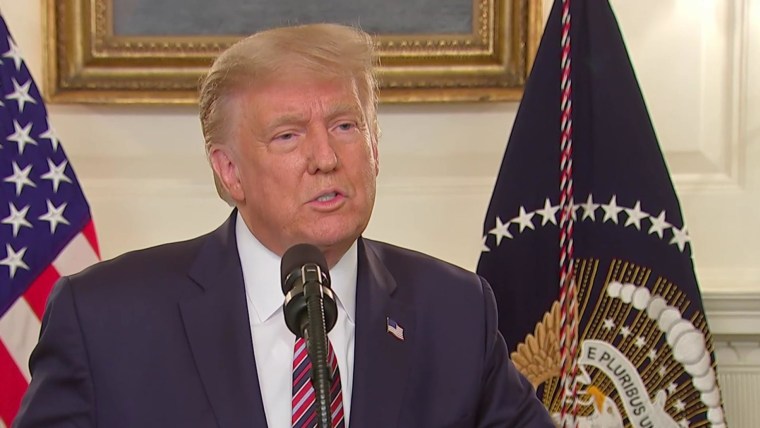WASHINGTON — President Donald Trump won’t have to look far to find the culprit behind the latest “political hit job” targeting him.
It isn’t “the swamp,” “the deep state” or the “fake news.”
It’s himself.
He knew how deadly the coronavirus was, and he played it down anyway. Bob Woodward, one of the reporters who took down Richard Nixon, had the foresight to record his conversations with a president who sometimes lies even when video evidence contradicts him.
“I wanted to always play it down,” Trump told Woodward during a phone call March 19. “I still like playing it down, because I don’t want to create a panic.”
The president, in justifying his sunny early take on the pandemic’s impact, has publicly described himself as a “cheerleader” for the country. But what he told Woodward privately about his view of the danger apparently contrasted sharply with the information he was relaying to the nation about the risks, then and for months to come.
“This is deadly stuff,” he told Woodward during a conversation on Feb. 7. “You just breathe the air and that’s how it’s passed. And so that’s a very tricky one. That’s a very delicate one. It’s also more deadly than even your strenuous flu.”
That assessment came just days before he told supporters that with warmer weather, the virus “miraculously goes away,” and more than a month before he downplayed the disease by comparing it to the flu, telling a Fox host as the wave of public health-driven shutdowns began nationwide that “we’ve never closed down the country for the flu.”
Trump responded to the early release of excerpts from Woodward’s forthcoming book, “Rage,” in typically pugnacious fashion Wednesday.
“It’s another political hit job,” he said in a brief exchange with reporters. Otherwise, he stuck to the talking points he has fallen back on for months: He did the best he could, he did better than anyone else would have, and his actions saved millions of lives compared to doing nothing at all.
Poll after poll suggests that voters haven’t been buying it. They think he’s done a poor job handling the coronavirus crisis. Most of them don’t think he’s honest and trustworthy. It’s easy to see how his remarks to Woodward acknowledging that he soft-pedaled the dangers of a disease that preys on the unguarded would hurt him on both counts. It’s also impossible to forecast that it would help him on either.
Nearly 200,000 Americans have died, the pandemic response has cost taxpayers several trillion dollars, and tens of millions of Americans are unemployed or underemployed. And Trump is on tape, from the week he issued stay-at-home guidelines, saying, “I still like playing it down.”
Democratic nominee Joe Biden lit into Trump during a speech to Michigan auto workers Wednesday, pointing out that the president revealed intent in the Woodward interviews.
“He failed to do his job on purpose,” Biden said.
Biden is certainly one foe whom Trump will have to deal with. But perhaps more important right now, the president once again finds that he is in a messaging war with himself that is making it very difficult to present his case for re-election to the public.
Before the Labor Day weekend, The Atlantic’s Jeffrey Goldberg reported that Trump had privately referred to dead American service members as “suckers” and “losers” and that he had trouble fathoming why anyone would volunteer for service.
On top of the Trump-vs.-Trump fight, a Department of Homeland Security whistleblower came forward Wednesday to allege that top intelligence officials had manipulated information to serve Trump’s political interests — including misleading the public about Russian efforts to influence the coming election — and The Associated Press reported that Vice President Mike Pence plans to hold a fundraiser with supporters of the QAnon conspiracy theory.
Trump announced Wednesday that he was drawing down the U.S. troop presence in Iraq to 3,000 from more than 5,000, and he named 20 potential Supreme Court picks. The information was met with a collective yawn, largely because those normally newsworthy announcements don’t shed light on decisions that directly and immediately affect the lives and pocketbooks of 330 million Americans the way the coronavirus crisis has.
Download the NBC News app for breaking news and politics
Nearly every American’s life has changed because of the breadth and depth of the pandemic and the response to it. And whomever or whatever each voter blames for the disease’s inception and spread, all but the most perverse among them would prefer that it hadn’t been this bad.
When The Washington Post published excerpts of Woodward’s book Wednesday, the White House was still working to discredit Goldberg’s reporting from last week. The main difference, of course, is that Woodward has tape from interviews with Trump.
In one way, the latest revelations are reminiscent of the “Access Hollywood” tape that surfaced in October 2016. Back then, Trump was heard in an outtake boasting about techniques for sexually assaulting women. The Woodward excerpts also include the president explaining, in his own voice, a personally damaging view he had kept hidden from the public.
But the key difference is that the thinking that was revealed or confirmed in 2016, as disturbing as it was, didn’t speak directly to how he might respond to the kind of once-in-a-lifetime crisis that voters try to envision when they make decisions about who should lead their country. If Trump is to survive politically, he’ll probably have to find a better explanation for his remarks than a self-executed “political hit job.”












